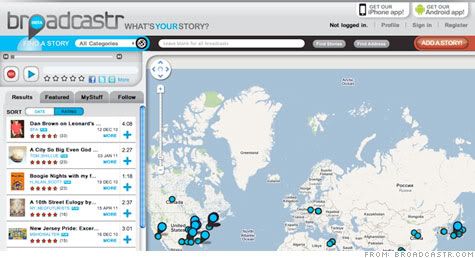Broadcastr: What’s Your Story? GPS and Audio Files Come Together in a Beautiful Way

Broadcastr is a new social media space headed by New Yorker Scott Lindebaum that revolves around the recording, uploading, and sharing of geographically tagged audio files.
Like Napster? Soundcloud? Myspace Music? No, not at all like them…
Via a refreshing notion of ‘location-based audio stories’, users are encouraged to record, upload and share geographically pinned audio files with one another.
Music of the user-generated kind will no doubt have a place, but Broadcastr’s focus is on other kinds of audio files such as stories, spoken word, environmental recordings, soundscapes, poetry, fiction, audio guides, sonic art and hopefully some forms we might not have thought of yet.
 The well-implemented Broadcastr app available for iPhone and Android makes it possible to explore an area, visit the locations of stories that interest you and even upload and pin your stories on the move with the help of detailed street maps.
The well-implemented Broadcastr app available for iPhone and Android makes it possible to explore an area, visit the locations of stories that interest you and even upload and pin your stories on the move with the help of detailed street maps.
A spooky, random, but fun feature named Geoplay can even automatically trigger relevant stories as you walk through their locations.
Sounds like Google maps with a soundtrack? No… it’s much more than that…
It’s worth noting that Google’s forays into improving speech recognition will eventually lead to the verbal content of audio and video files being indexed and therefore searchable online. Audio files containing spoken language are destined to find a new place in the global information pool, and will gain a new relevance to search engine optimisation in the process.
So why do we need Broadcastr? Today’s dominant Social Media Sites combine the user-generated content, forums and newsgroup based networks of the early internet with the sophisticated modern web’s ability to turn every user action into cash.
Working on the assumption that users will continue to stare at screens every spare minute of the day, Facebook is really no more than an online mashup of television, text messaging, browser games, newsgroups and the family photo album. The real key to Facebook’s success was putting all that stuff in one browser tab before anyone else had thought of it.
Even disregarding the slobs and couch potatoes of the world, the majority of people in industrialised areas with ‘normal’ lifestyles are still pretty much glued to their various screens. So is there room for a social media platform that encourages you to go out and explore?
Initially, I thought the concept of Broadcastr just sounded like yet another mashup of existing ideas; the geographical pin and describe features of Google Earth, the user created audio database of Soundcloud, and the share and promote functionality of YouTube, Twiter, Facebook, Google+ etc.
But on second thoughts, Broadcastr is more interesting and potentially very powerful. The idea of creating, sharing and experiencing audio from real people, with no editor, no censorship, and no middle-man is democratic and liberal to the core. Listening to stories in the places they are recorded could reveal facts, points of interest and encourage new trains of thought, opening users up to unexpected experiences and points of view.
 There is also the potential to be transported – however temporarily – into other user’s sound worlds. Trying this side of Broadcastr out this week, I’ve enjoyed the train ride to work a lot more listening to stories and sounds from other rail journeys far away. Broadway to Lafayette, stories about train nutters… it’s all good fun. New York seems to be the best covered city so far; could this tell us something about how much New Yorkers love to talk?
There is also the potential to be transported – however temporarily – into other user’s sound worlds. Trying this side of Broadcastr out this week, I’ve enjoyed the train ride to work a lot more listening to stories and sounds from other rail journeys far away. Broadway to Lafayette, stories about train nutters… it’s all good fun. New York seems to be the best covered city so far; could this tell us something about how much New Yorkers love to talk?
I am only just beginning to think about the possibilities here, but they include free-wheeling subjective creativity, instant un-moderated citizen journalism with a global reach, and personal, familial and historical information. Imagine walking around your great-great-grandmother’s neighbourhood today, listening to her pointing out the sights and telling her stories two hundred years ago; just one kind of experience you could be seeding on Broadcastr right now.
By leaving any kind of legacy for our descendants and successors, we take part in folk history and assume our position in the collective memory. Forgive the grand words, but these concepts had huge evolutionary significance when spoken words were all that humans had; and before print, radio, and then the screen came to dominate our cultural lives, the only way to censor the people was to cut out their tongues.
For most of our time on Earth, humanity carried all its wisdom, songs, stories and legends through the ages via speech, listening and memory. What is safe to eat? What will eat you? What are the historical consequences of actions? Aural transmission (suppress your snigger!) can be as simple as having a chat down the pub, as entertaining as seeing a stand-up comedian in their prime, or as powerful as witnessing a great orator like Martin Luther King.
It’s not all going to be grand, artistic, valuable or worth hearing. Let’s face it, every new web platform invariably gets used for internet marketing of one kind and another, and the audio-spamming of Broadcastr will be directly proportional to its popularity. Broadcastr will have its fair share of tacky commercially sponsored advertorials – with the huge bonus that we won’t have to listen to them. And – I’ve already found a few of these – plenty of wannabee spoken word artists, out of work actors and dull chatterboxes who just love the sound of their own voice.
Here’s my Broadcastr request: Can some witty and interesting people please upload some art gallery, museum and random attraction audio guides? The world needs an alternative to all those cheap voice-over artists reading lame, patronising and humourless ‘Discovery channel’ style scripts. Apparently commercial agreements are in place which will see the likes of Fodor’s travel providing premium content, and Broadcastr foresees short advertising slots as one way to monetise the service.

What is scary is the potential for Broadcastr to integrate advertising with Broadcastr’s geo-locational technology, and user profiles; what Facebook or Google might do with Broadcastr if they bought it out, for example. I’m reminded of the scenes in sci-fi movie Total Recall, where Arnold Scwarzenegger’s character is personally targeted by advertising holograms on his way to work.
The possibilities… “Hey Gez! Your shoes look a bit worn… turn left NOW and step into Jimmy’s trainer-world for the deal of a lifetime!” “You look hungry Mr Hebburn – just shout BURGER DEAL right now and we’ll be there in seconds!”
In terms of what it makes possible, Broadcastr is highly original and shouldn’t be compared with anything – especially the repetitive and screen-bound social media offerings humanity is currently so obsessed with.
In contrast, Broadcastr could actually represent a new kind of social interaction, and a story worth telling. Hope to hear you soon.
Gez Hebburn: Writing on the subjects of search engine optimisation, social media, internet marketing and web design, Gez focuses on the points where culture and technology collide.


Great post! this Broadcastr sounds really good, I really hope that the content in there will be in high quality.
Never heard about Broadcastr, but it sounds interesting. thanks for the info!
Sounds interesting, Broadcasting your own story. this can make a hit. Thanks for sharing.
Wow! It triggered on my mind. I want to broadcast my own story too.
Audio file come up to give a good outcome. Broadcasting is very useful for those workers with this kind of field. Broadcasters.
Well this is interesting, but the problem here is when you broadcast something, and its all a bunch of lies. in telling story you must prove it well. and can be based in true to life situation.